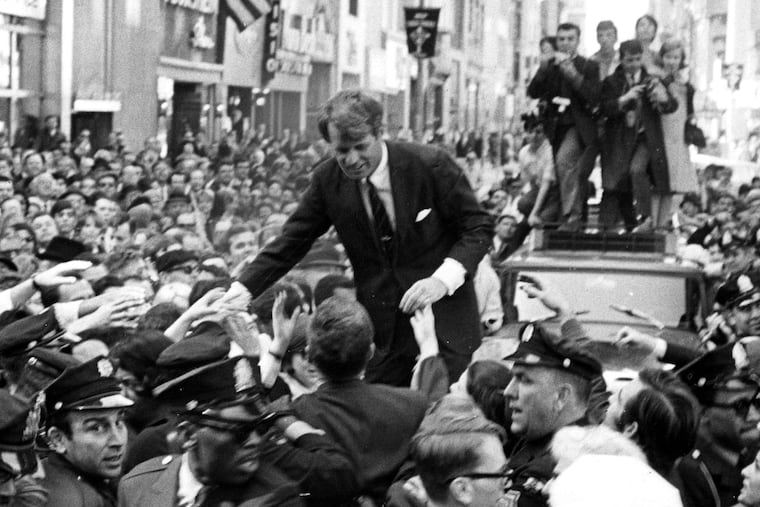As Americans protest in 2020, remembering RFK’s 1968 response to MLK’s assassination | Opinion
True leaders are capable of both toughness and empathy. Our country saw that even in one of our country’s most tragic moments.

This weekend, I was thrust back to 1968, once again looking for leadership in a time of justified racial outrage.
President Donald Trump’s offered a clear call to arms. “When the looting starts, the shooting starts,” he tweeted last Friday as the protests and violence began to spread. He called the Minneapolis mayor “weak,” threatened “military” action if city leaders failed to crack heads.
This was only the beginning of Trump attempting to shape the national narrative.
“I am your president of law and order,” he then told the country Monday night. It was him protecting the American people against the “thugs.” He promised thousands of troops to “dominate the streets.”
» READ MORE: Here's live coverage of what's happening Tuesday
This is Trump’s familiar imprint. It is us against “them.” He’s telling the American people as they watch TV that they must choose between him and the protesters. He’s telling voters they need to decide between him, the man of strength, and the Democratic mayor of Minneapolis, who showed empathy for those angry about the police killing of George Floyd.
For Donald Trump, politician, this is a useful division, of course. It puts all the bad pictures of looting and burning on one side of the screen, his face of defiance on the other.
But it is also a false division and needs to be challenged forcefully.
True leaders are capable of both toughness and empathy. Our country saw that even in one of our country’s most tragic moments. It’s a familiar story to some but needs to be retold in this crucial time of reckoning.
In April 1968, Robert Kennedy, who was running for president, got word that the Rev. Dr. Martin Luther King had just been killed. About to enter an African American neighborhood in Indianapolis, he was warned by police not to go in. If he did so, he has told, he would have to proceed without police protection. The situation was seen as every bit that dangerous.
John Lewis, who now serves in Congress, was an organizer of the planned evening rally. He had a different view from that of the police. “Some of us felt that he must come.”
And he did.
On arrival, Kennedy learned that he himself would have the duty to tell the crowd about King’s assassination. You can hear his host telling him that. News, even the most horrible, didn’t travel as fast half a century ago.
“Do they know about Martin Luther King?” Kennedy could be heard asking on the tape. No, they didn’t.
» READ MORE: How should policing change? Share your ideas with us. | Opinion
And so he began, standing on that platform in Indianapolis. “I have some very sad news for all of you ... ,” he began. “Martin Luther King was shot and was killed tonight in Memphis, Tennessee.”
Then he got to his urgent concern. It was that King’s death would ignite a national explosion of justified anger.
“For those of you who are black – considering the evidence evidently is that there were white people who were responsible — you can be filled with bitterness, and with hatred, and desire for revenge. We can move in that direction as a country, in great polarization – black people amongst black, and white amongst white, filled with hatred toward one another.
“Or we can make an effort … to understand and to comprehend and replace that violence, that stain of bloodshed that has spread across our land, with an effort to understand compassion and love.”
It took courage for Bobby Kennedy to head into that neighborhood that horrible night. It took empathy to want to do it, to keep a commitment as John Lewis said he felt he had to.
That night, rioting, burning, and looting broke out in 100 American cities. Indianapolis was not among them.
Bobby Kennedy didn’t like what he saw happening. His daughter Kerry, just 8 years old, remembers him watching the scenes of rioting on TV. The former U.S. attorney general said he understood their frustration behind it all but said it was still lawless and bad.
RFK was killed himself a few weeks later. John Lewis remains today a conscience for the country, especially on human rights.
Both knew that courage and compassion can and should be partners in our human community. A good leader doesn’t set them at war with each other, doesn’t force people to choose between a decent respect for justice and the will to reject violence.
Whatever else we decide in this difficult time, we need to hold to that standard.
Donald Trump attempts to speak for a 21st-century “silent majority” against the protesters. But a true leader would, as Bobby Kennedy could, also hear those angry protesters as the voices of his fellow citizens.
It is a time for presumed Democratic nominee Joe Biden and others with a national voice to take up the role this president has refused: American leader.
Chris Matthews, a native Philadelphian, hosted “Hardball’ on MSNBC. A veteran political commentator, he wrote “Bobby Kennedy – A Raging Spirit.”